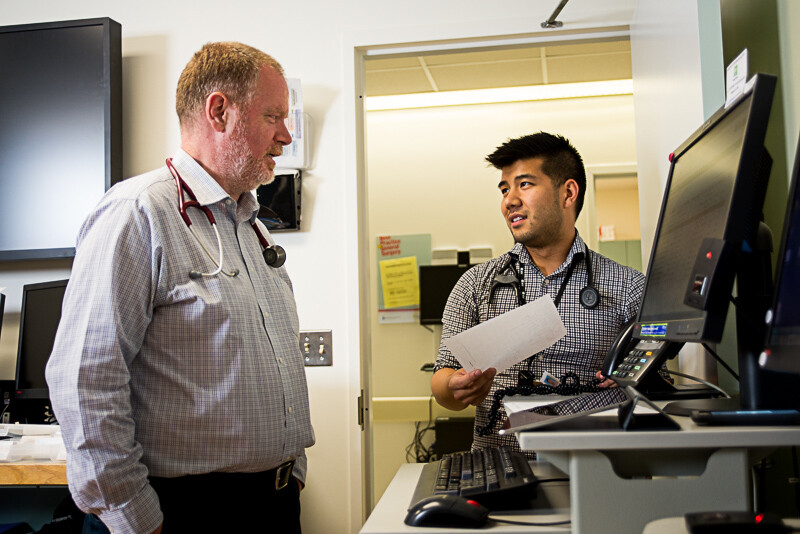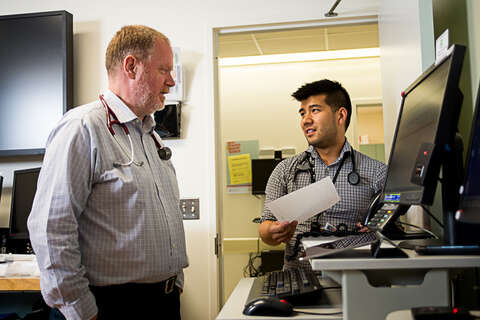Main Second Level Navigation
- Welcome
- Why Toronto?
- History of the Department
- Vision & Strategic Priorities
- Our Leadership
- Our Support Staff
- Location & Contact
- Departmental Committees
- Department of Medicine Prizes & Awards
- Department of Medicine Resident Awards
- Department of Medicine: Self-Study Report (2013 - 2018)
- Department of Medicine: Self-Study Report (2018 - 2023)
- Communication Resources
- Department of Medicine Annual Report
- News
- Events
Coaching & Feedback in CBME

Rebecca Dubé

Have you ever participated in a competitive sport? Or played a musical instrument? If so, you’ll know that good feedback – the kind that makes you a better athlete or musician – is crucial to improving your performance.
But at times, coaching and feedback can be a challenging process, both for the giver and the receiver of feedback.
Below, you’ll find some key thoughts on Feedback and Coaching in CBME.
FEEDBACK
Feedback has been identified as one of the most powerful interventions at a teacher’s disposal for helping a learner improve their performance. However, feedback can be challenging: it can be difficult for the teacher to give good feedback, and it can be challenging for the learner to accept feedback, particularly if it conflicts with their own view of their performance. In our busy clinical practice, it can also be a challenge to find the time to have feedback conversations.
Four Key Messages on Feedback:
- Feedback can be difficult for both the giver and receiver. Faculty often report apprehension about how feedback will impact the relationship they have with the resident, and the resident’s self-esteem. Residents also recognize that feedback, particularly if it’s constructive, can be difficult to hear.
- Our mindset impacts how we handle feedback. Dr. Carol Dweck’s work on mindsets has shed light on how we handle feedback. If we see success as the result of innate talent – termed a “Fixed Mindset” – feedback can feel like an evaluation. However, if we view success as the result of continued hard work and effort – termed a “Growth Mindset” – feedback is seen as useful in helping us direct those efforts efficiently. For more on this, see Carol Dweck’s work on Fixed and Growth Mindsets.
- A request for feedback can mean different things. Someone requesting feedback be asking for reassurance that they are on the right track. Or, they may want to know how they compare to peers at a similar level. Alternatively, they might be asking for coaching and tips on how to move to the next level in their performance. Ensuring the feedback giver has a good understanding of the type of feedback requested ensures that feedback is maximally actionable.
- Feedback is most effective when it occurs in the context of a trusting relationship. A trusting relationship has been shown to facilitate the process of giving and receiving feedback. Both the feedback giver and receiver have a responsibility to help foster this trusting relationship. Faculty can foster this relationship by giving focused, targeted feedback according to best practices. Residents can nurture this relationship by asking for feedback only when they plan on acting on it, and by fostering a Growth Mindset.
For more tips and hints related to feedback, click here.
COACHING
Coaching can be found in a wide array of disciplines – in business, sports, and music, to name a few. Coaches use repeated, direct observation and feedback in the context of a longitudinal relationship to help an individual progress towards their performance goal. Through ongoing observation, coaches identify behaviours that impact an individual’s performance, and guide them towards performance improvement.
Three Key Messages on Coaching:
- Coaches actively build a relationship with the individual they coach. Coaches spend time creating a partnership with the individual they coach, establishing rapport and trust, and determining the goals of the relationship. This trusting relationship facilitates the effective delivery of targeted, constructive feedback.
- A longitudinal relationship enhances the effectiveness of coaching.A long-term relationship, with repeated interactions and direct observation over time, fosters mutual trust and aligned role and process expectations, facilitating effective performance improvement conversations.
- Coaching is an important element of self-directed learning. Coaches identify the performance goals of the individual they coach, in the context of their specific overall learning plan. The coaching relationship then supports the learner in achieving their specific goals.



